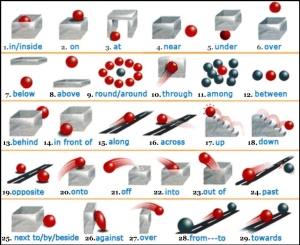 Prepositions of location and movement can be difficult to remember. Look at the pictures in the CHART and then read more about the correct way to use these prepositions of location. They will help you explain where something is located or how something moves around.
Prepositions of location and movement can be difficult to remember. Look at the pictures in the CHART and then read more about the correct way to use these prepositions of location. They will help you explain where something is located or how something moves around.
There are also links to videos of popular songs that use these prepositions, along with the lyrics.



